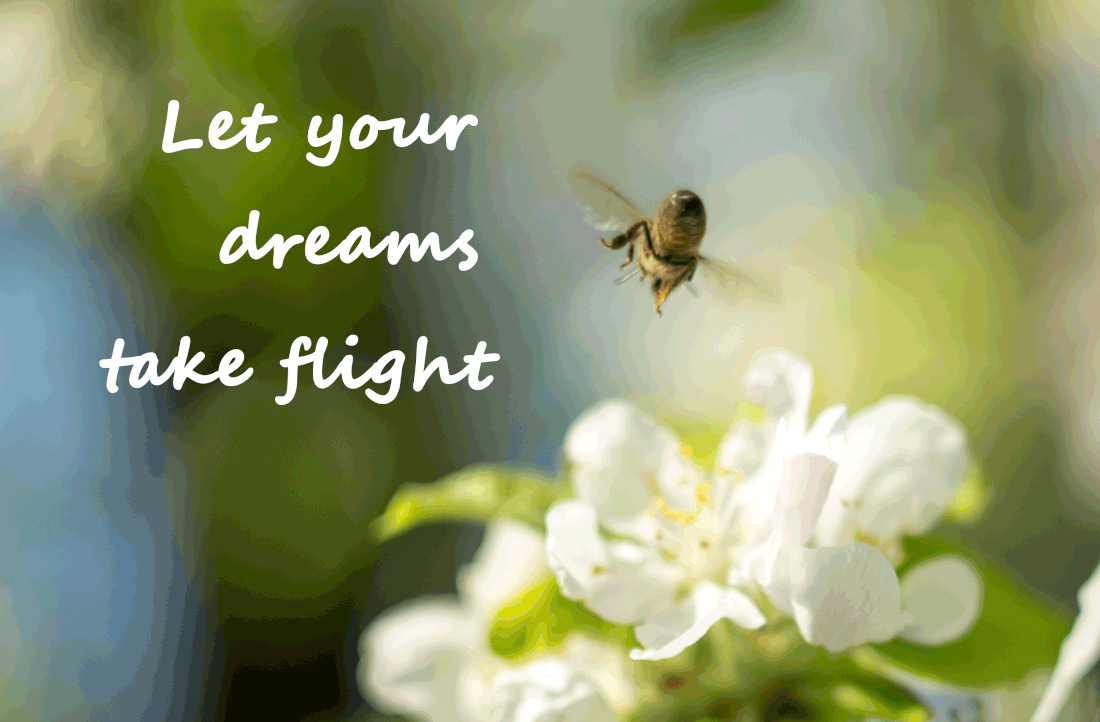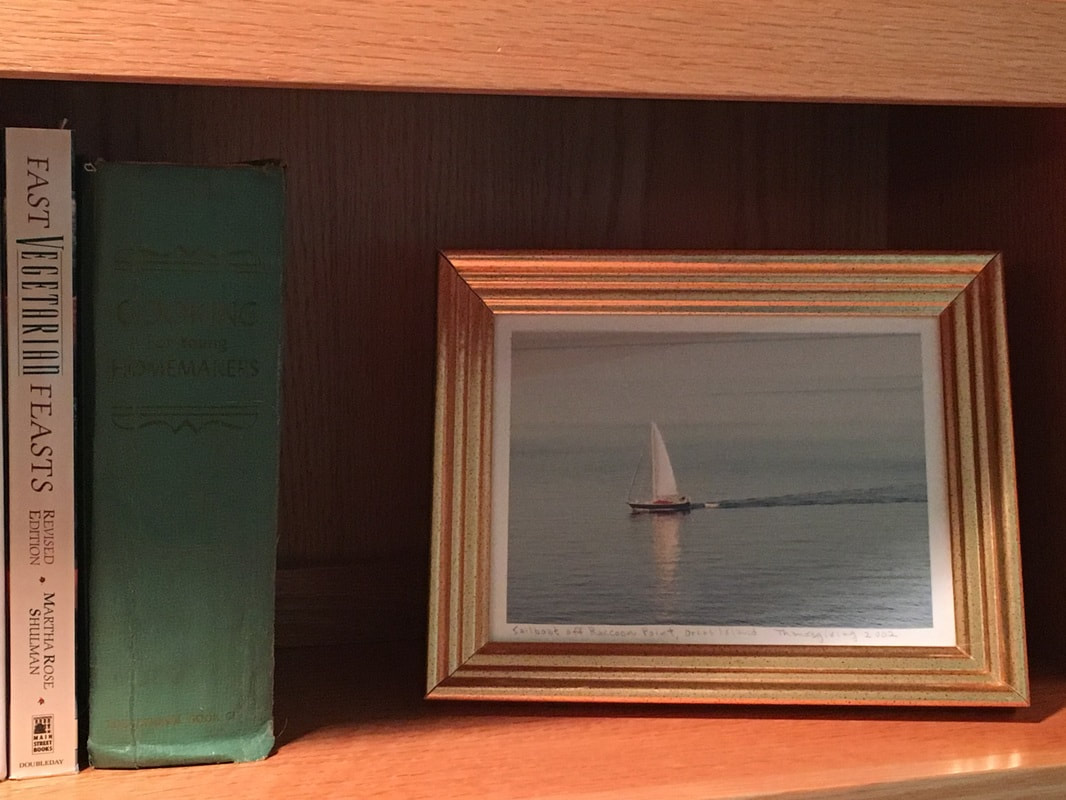|
[Originally published 6/20/17]
For many years now, my inner guidance has been becoming more and more obvious to me. Sometimes it whispers quietly, but other times it is amusingly loud. It’s the loud messages that really get my attention. The other day as I was talking on the phone I realized that I had a bee in my house, something which my cats brought to my attention as they began to chase after it. I got off my call quickly to deal with this unwanted visitor. Despite the fact that bees can be dangerous, I had no intention of harming it. You see my policy in my home is that unless there is an infestation, all bugs get escorted outside as gently and humanely as possible. I’m generally neither skilled enough nor brave enough to simply use my hands for this task, but instead rely on a designated “bug jar” to help me catch and release the little intruders. While on the call I had had my Bluetooth headset on, and for some reason after I hung up the phone to deal with the bee, the music on my phone began playing. I wondered why I suddenly had a song in my ear, and recall clumsily trying to turn it off while simultaneously retrieving the bug jar. Despite my efforts the music continued, so my second thought was to hit the fast forward button enough times until I reached a song which fit my mood. Yet with the bee flying around quickly and erratically, I realized it was a less than ideal time to be choosy about my music. Instead I focused on the goal—to catch the little guy without harming it OR angering it. As I brought the open jar towards the bee on the window, I noticed what was playing—a Christmas song. For bee-catching in the month of June, Christmas music seemed to be a very inappropriate choice! However with the jar in one hand, the lid in the other, and a bee that was becoming increasingly agitated, I decided holiday music was perfectly fine for bee-catching after all. Within about twenty seconds I had successfully captured the bee within the confines of the jar. As I walked toward my front door with the captured bee I noticed the lyrics of the song. “Magic fills the air. Spirits everywhere…” I stepped onto the porch, being careful to close the door behind me—an important part of this type of task, which (as you may have guessed) I have learned the hard way. I then opened the jar, giving the bottom of it a little tap to encourage this intruder to return to its natural home. Precisely at the moment that the bee flew out of the jar, the song continued: “Let your dreams take flight.” I laughed at the synchronicity of these lyrics, recognizing that the bee was now able to live its springtime dream, literally flying from flower to flower. My amusement then shifted into recognition that there may be an underlying message in this for me. Through this brief experience with a bee and some "random" music, I had been gifted with both symbolic and literal guidance. Perhaps it is time to follow the bee's example and exit the confines of whatever does not serve my nature. Perhaps it is time to experience a more authentic freedom and allow my dreams to take flight.
0 Comments
[Originally published 4/23/17]
Recently as I was making the bed and adding the final touch of a throw blanket across the corner of my bed, I realized something about myself. I have great attachment to the various throw blankets around my house. The one I keep on my bed, so soft to the touch and the perfect shade of smoky lavender. The one across the arm of my favorite living room chair, pale teal in color and lightweight enough to provide just enough warmth there by the fire. The fuzzy blue one on my couch, quite soft and large enough to keep anyone lying there comfortably warm while watching television or taking a nap. The woven burgundy and cream blanket on my work chair, looking beautiful next to the floral painting above it, providing warmth when I am on business calls or working on my computer. I began to ponder why I feel such deep appreciation for blankets. Yes, staying warm is a basic human need. Yes, I enjoy decorating so I care about color and texture. But there must be something more to it. And then I remembered. When I was a little girl I had two small blankets that I took to bed with me every night. Somehow these blankets got nicknamed Christine’s “lovey covers.” They were soft with silky edges, eventually tattered but always loved. Here was my answer: the appreciation I feel as an adult for throw blankets is rooted in my childhood joy. I believe that our fond memories of childhood relate to our deep connection with life. It’s about our relationship with family, friends, pets, nature, and our various experiences. As children we are very rooted in our senses, so little things make big impressions: the soft feel of a blanket; the cadence of a nursery rhyme; the smell of our favorite meal cooking; the sound of crickets chirping on a summer evening; the sight of a squirrel climbing a tall tree; the sound of children playing outside; the look, feel, and smell of a brand new book; the warmth of sunshine upon our face; the sensation and trajectory of water splashing; the scent of a new box of crayons; the tickle of ice cream melting onto our hand; the sound of laughter from those we love; the repetitive breathing of our dog cuddling next to us; the sound of rain hitting the roof as we fall asleep. I suspect that somewhere along the way many of us let go of some of that childlike wonder and appreciation. Our senses become dulled by the responsibility associated with living. We rarely allow ourselves to experience the fullness of the multitude of moments we live each day. Fortunately, there is an anecdote to this, and it’s simple. We can open our awareness and view our daily experiences with a renewed sense of wonder. At various moments throughout the day, we can consciously choose to live more fully. It’s a simple prescription, but can take on a variety of forms: Pay close attention to the path of the bird flying past your window. Experience the sensations in your body as you dance to your favorite music. Listen carefully to the clicking sounds as you type on the computer. Delight in the colors and smells of the various ingredients as you prepare dinner. Feel the sensation of the grass between your toes. Listen to the nuances of your cat’s meows. Examine how the ink from the pen flows onto the paper as you write out a grocery list. Listen carefully to the tone of voice when others speak. Become aware of the tingling in your body after taking a few deep breaths. Very simply, pay attention and appreciate what you are experiencing in that moment. Purposely experiencing childlike wonder, when we are no longer young and naïve, can have a powerfully transformative effect. It is about engaging joyfully in the moment despite our responsibilities, relationship problems, financial stress, or the chaos of some external event. It speaks to life about what we want more of, instead of communicating resistance to what we don’t want. And life is always listening. In some ways, choosing childlike joy in the moment is a form of protest. No, it’s not a protest against responsibility or adulthood. Rather, it is about protesting the common notion that life is filled with drudgery. In that moment, it’s making the choice to experience gratitude over anything else. If you choose to allow yourself more of this type of experience, be warned: it has its consequences. You may begin to question some of the choices you’ve made in life, and find yourself releasing those things which have been sucking the childlike joy out of you. People in your life may also begin to look at you differently, wondering why you seem somehow lighter. There may be some who miss the old you because they feel more at home around those who also feel burdened by life. Others may be intrigued and wonder what your secret is. Did you get a raise? Are you now in love? Did your child make the dean’s list at college? Whether or not you share your secret, I assure you this: your appreciation for life will be contagious. What moments of childlike joy might you discover today? [Originally published 4/2/16]
Have you ever felt guilty for having a “negative” emotion? After an exhausting week, Susan was grateful to relax on the couch and watch a movie with her husband Bob. During a sad scene in the movie, a few tears began to stream gently down Susan’s cheeks. Bob looked over at her and jokingly said, “Uh oh. Here come the waterworks again!” Susan immediately felt a bit embarrassed and then angry with Bob for his teasing, but did her best to keep up a friendly façade. As she stewed over how judged and misunderstood she felt, she became angrier and angrier. Then she began to feel guilty for feeling that way because after all, Bob had been nice enough to let her choose the movie and had even put his arm around her while sitting together. How could she consider herself to be a loving person yet feel such deep anger toward her partner over such a small thing? Guess what? All your emotions are helpful to you on your spiritual journey! Among some of the “spiritual correctness” out there, I have seen a lot of what I call emotion-bashing. There is a prevalent belief that our emotions somehow have the potential to lead us down the nonspiritual path. More specifically, the idea is that we have spiritually based emotions (such as joy, compassion, and love), and we have ego-based emotions (such as anger, jealousy, and rage). But I am here to cry “foul” to this dichotomous self-judgment! Our emotions provide us with an internal guidance system which helps us navigate our way to a more soul-led life. If we recognize our emotions to be divine messengers, it totally changes the dynamic we have with ourselves. Those “positive” emotions let us know what is important for us on our journey. What are known as “negative” emotions communicate one of two things: (1) what is discordant to our soul, or (2) where we have pain which needs to be explored and released in order to experience love and life more fully. Whenever an emotion arises, the key is to step back and assess its underlying message so that we have the opportunity to make new choices which support us on our journey. In the example above, if Susan had let go of her self-judgment and assessed what was going on, she may have found one of two things. She may have realized that Bob can be unaccepting of her emotions, which is getting in the way of experiencing the kind of connection her soul craves. On the other hand, she may have recognized that she is sensitive because of family ridicule she experienced as a child, which contributed to closing her heart in certain ways. In either case, Susan’s emotions could guide her to greater clarity and love. If we stop judging our emotions as good or bad and lovingly accept them all, then we are welcoming divine navigation to more spiritual living. I want to hear from you...
 [Originally published 3/25/16]
Don’t let popular myths get in the way of your spiritual development! There are some long-held beliefs about spirituality which are often presented as truth, but are actually misconceptions which, when you buy into them, can hamper your spiritual growth. In the following series, I will illuminate the fallacy behind these myths, and help empower you to more fully embrace your own spirituality. Here in Part 1 of the series, I address a common phrase which is often used to describe how to connect with our spiritual nature. Spiritual Myth #1: Spirituality is something we should seek For as long as I can remember, both within the context of religion as well as in the broader consciousness movement, I have heard the words "seek" and "spirituality" going hand-in-hand. If you are on your path to connecting with God/the divine/universal intelligence/your soul /the Universe/spirit, then it is widely accepted that you are a "spiritual seeker." Do you want to experience your spiritual nature? Then the common advice is that you need to "seek spirituality." Google these two words together, and what do you find? Listings for books, articles, blogs, websites, and podcasts—pages and pages of them. So why on earth would I want to challenge such an established concept? Because I now understand that the very act of seeking spirituality may prevent us from experiencing it fully! There are two problems with the notion of seeking spirituality. First, many believe that this means looking for something outside of themselves, which is a misnomer. Not only does the divine reside inside each of us, but our experience of all that is spiritual is an internal and very personal thing. By seeking it elsewhere we are essentially giving our spiritual power away to someone or something external instead of stepping into the power our own spiritual experience. By focusing outside of ourselves, we also run the risk of missing the natural spiritual flow and processing going on within us. The second reason seeking spirituality is counterproductive is because it is not through striving or pursuit that we experience anything spiritual. Rather we experience our spirituality by letting go of control and allowing it to come into our awareness. Think of tasting a piece of chocolate cake. We wouldn’t say, “I think I might be able to taste it, but I’m not sure I am tasting it fully because I have never learned the art of tasting, and I’ve never counted my taste buds to assure that I really have the ability to taste, and I’ve never compared what I taste to that of an expert taster or other tasters of the world. So I must go seek taste.” No! We just let go into the joy of experiencing the texture and flavor of the cake. Experiencing spirituality should be the same way. Some may argue that the concept of seeking spirituality shouldn’t be controversial because it is merely a matter of semantics—that is, how we interpret the word “seek.” But words are very powerful in creating our subconscious beliefs, and the definition of “seek” means to search, strive for, or attempt to find something. For many of us, our first introduction to this word came from playing the childhood game of hide and seek—and remember in that game how difficult it could be to find every last person! So if we think we need to “seek spirituality,” then on some level we are subscribing to the belief that there is something missing which needs to be found. However to connect with our spiritual nature, it’s really not about seeking something mysteriously hidden or lost. Rather, it is about becoming aware of an inner experience which is as real as taste; it just requires being open to whatever we are experiencing in order to recognize it. Spirituality is our birthright, and we don’t need to seek that which is an integral part of us. Once we recognize this, then we become better empowered to access our spirituality with greater frequency and ease. I’d love to hear your perspective about this!
[Originally published 3/10/16]
The memory of my parents still remains an important part of my life nearly five years after their passing. The pain caused by their absence has diminished, and life has moved forward. Yes, there is an empty space which resides within me, but strangely there has also been a growing fullness which has emerged out of the loss. I grew up in a loving yet dysfunctional household, a combination which created a kind of inner crazy-making which I’ve been processing for years. Despite that, well before my parents exited their roles in my life I had come to a place of general acceptance and peace about who they were and how that affected me. I could see their flaws, their fears, and their limitations. And I also could feel their love, understood their good intentions, and could appreciate much of what they had sacrificed for their children. One of the things which has surprised me over the years since their deaths has been how processing the loss of my mother and father hasn’t just been about me, as an adult, letting go. There has also been a grieving of the loss for the child within me at various stages: the three-year-old who used to wrap her entire hand around her father’s little finger as they walked together in stores; the six-year-old who baked cookies with her mother on a rainy afternoon; the pre-teen who got help on her homework from her dad well into the evening; and the teenager whose mother generously shared her car with her, even when it wasn’t convenient. As I have processed the huge loss for each of these children within me, something extraordinary has happened: my heart has opened to love that I would not have experienced as fully had I not been forced to revisit it. As the emptiness has shifted into a new type of fullness, I have begun to hear echoes of my parents in unexpected ways. One day recently I was fixing my morning cup of coffee, and I felt a deep connection to my father. He had a great appreciation of coffee—the aroma of the ground beans, the warmth of the beverage, and the taste of it blended with plenty of cream and sugar. I recall that on many an afternoon when I visited, he would put on a small pot so that we could share our love of coffee along with the conversation. I have had many other reminders of my parents while working in the kitchen. Recently when preparing a meal, I went to the bookshelf in the kitchen to retrieve a cookbook. On the shelf I noticed the dog-eared cookbook my mother had used for decades before she passed it on to me, a book containing recipes which I had used early in my culinary training. Glancing at that book I realized that I had resisted my mother’s sexist perspective that it was the woman’s role to prepare the meals. Yet despite my resistance, my mother managed to guide me to become a good cook anyway, something which I truly appreciate. Sitting on the bookshelf near the cookbooks was a framed photograph of a lone sailboat, a photo which my father had taken on a family trip several years earlier. I remembered his enthusiasm for photography and nature, and how proud he was of that photo. Photography was also his means of commemorating important events such as that special Thanksgiving gathering when he took the sailboat picture. As I went back to chopping vegetables with my chef-quality knife, I smiled as I remembered my mother’s fear of sharp knives, and laughed gently as I remembered her drawer full of blunt, inexpensive knives which were a challenge to use. Yes, my mother taught me to appreciate a sharp knife! She also shared the importance of spices, color, and nutrition when cooking. My mother also demonstrated that preparing food can be an expression of love, a type of love which I have gone on to share with my own family. Despite the fact that many years have passed since my parents’ deaths, who they were and what they offered remains very much a part of me. Even today, I hear echoes of my parents in the kitchen… If you have lost a parent, what sorts of reminders help you to feel the fullness of your connection? |
AuthorLike you, I am on a journey--a path filled with joy and sorrow, expansion and contraction--with beautiful lessons and fascinating insights each step of the way. Thank you for joining me for a small part of my journey. I look forward to connecting with you on yours. Archives
December 2020
Categories |




 RSS Feed
RSS Feed